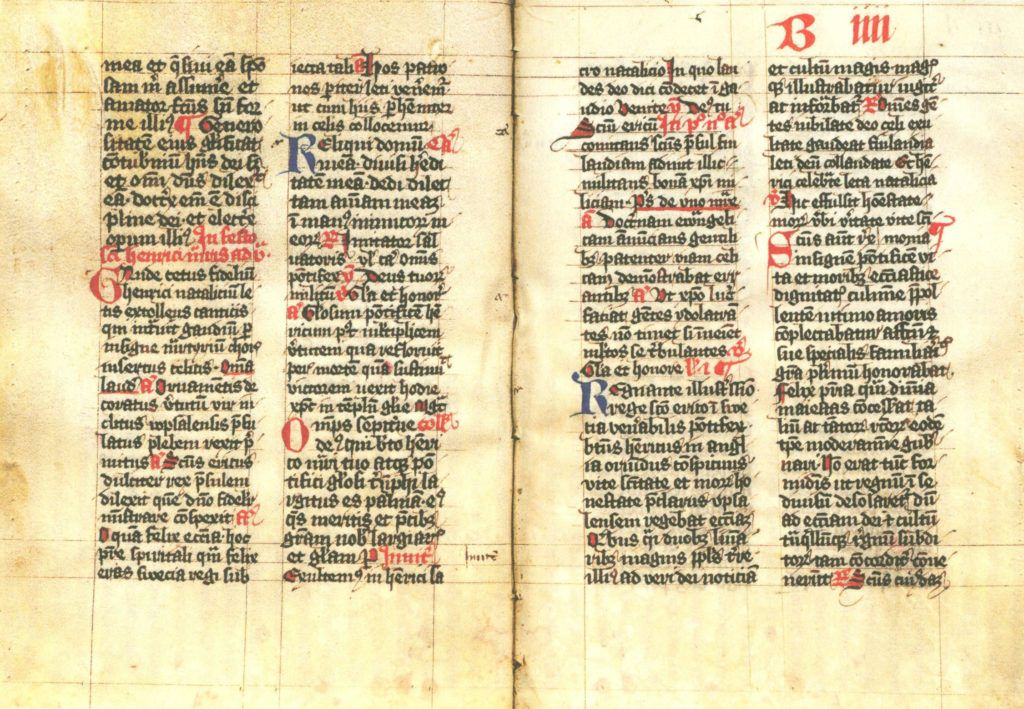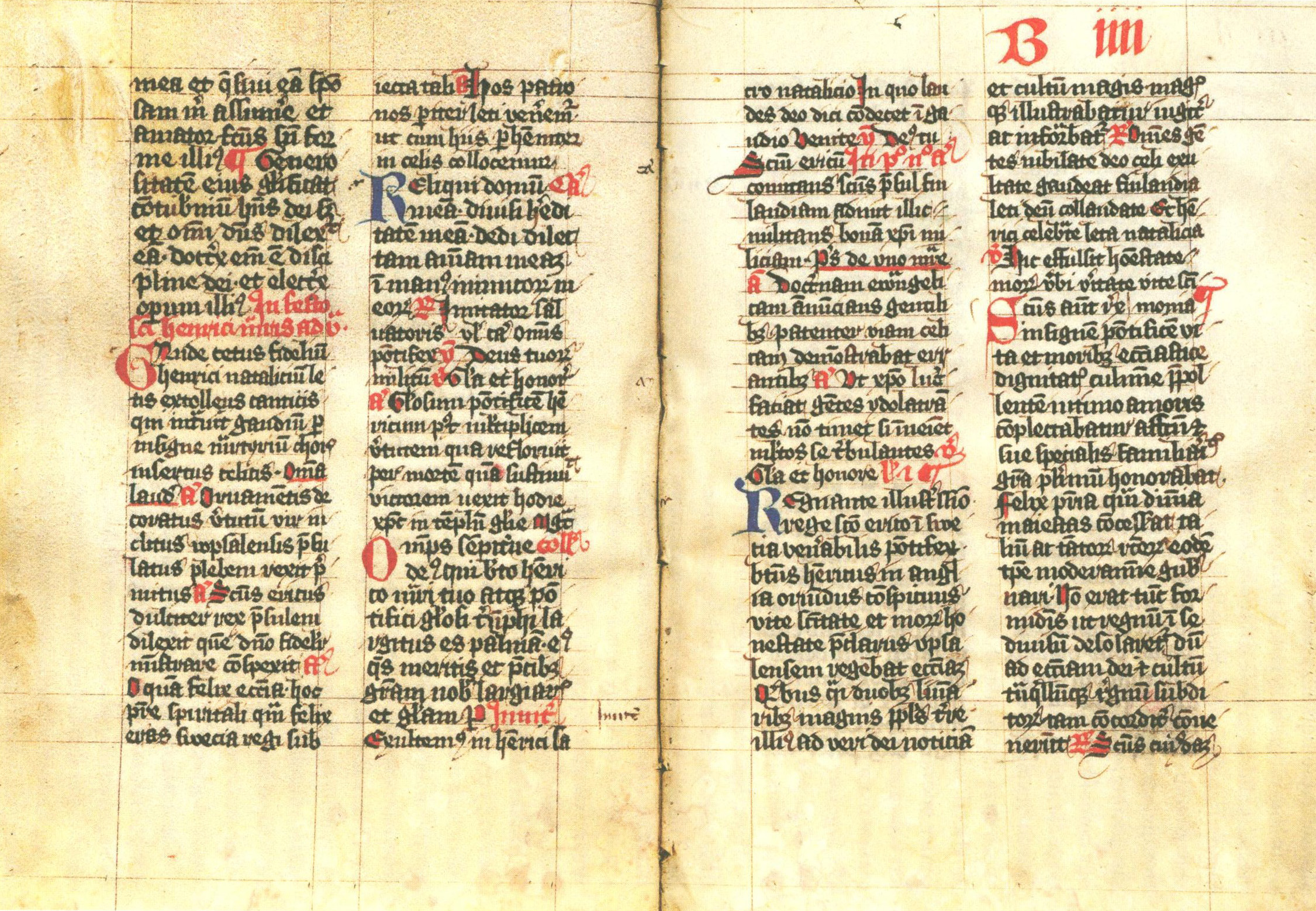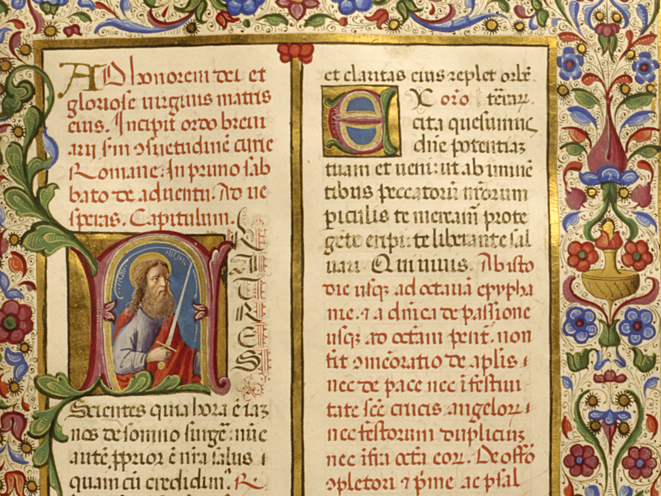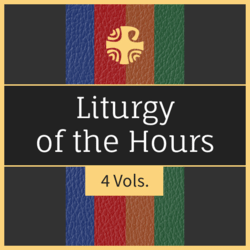By Brody Stewart

Most people may not realize it, but the Church has not one, but two great public prayers. The first is, of course, the celebration of Eucharist, the Mass, with which every Catholic is already familiar. Priests and consecrated religious, however, are just as familiar with the Church’s second great public prayer: the “Liturgy of the Hours,” also known as the “Divine Office,” or the “opus Dei” (“the work of God”). The Second Vatican Council described this prayer as “that hymn which is sung throughout all ages in the halls of heaven” (Sacrosanctum Concilium 83), “the voice of the bride addressed to her bridegroom” (84), and even “the very prayer which Christ Himself, together with His body, addresses to the Father” (84). This is not just flowery theological language. Along with the Eucharist, one might be so bold as to call the Liturgy of the Hours the “source and summit” of Christian prayer (cf. Catechism of the Catholic Church 1324).
But what is the Liturgy of the Hours? At its core, it is a regular recitation of the scriptures and in particular, the Psalms, which have always been the prayerbook of God’s chosen people. Before the coming of Christ, Israel prayed the Psalms as a way to give collective voice to the breadth of their religious experience—i.e., the whole spectrum of sadness, joy, anger, frustration, and hope. But after Christ’s incarnation, death, and resurrection, a new light shone upon the Psalms: Christ himself came to be seen as the true subject of these songs. According to the author of Hebrews, Christ quotes a Psalm upon his entry into the world: “Sacrifice and offering you did not desire, but a body you prepared for me; holocausts and sin offerings you took no delight in. Then I said, ‘As is written of me in the scroll, Behold, I come to do your will, O God.’” (Hebrews 10:5-7, quoting Psalm 40:7-9 [LXX]). So too did St. Peter, in his speech at Pentecost, put the words of Psalm 16 on the lips of the soon-to-be-resurrected Messiah: “you will not abandon my soul to the netherworld, nor will you suffer your holy one to see corruption. You have made known to me the paths of life; you will fill me with joy in your presence.” (Acts 2: 27-28, quoting Psalm 10-11). Perhaps most strikingly, Jesus himself quotes Psalm 22 as he dies on the Cross: “My God, my God, why have you forsaken me?” (Matthew 27:46, quoting Psalm 22:2). As Christians pray these ancient texts, they are mysteriously drawn into the eternal dialogue between God the Father and his beloved Son.
It should come as no surprise, then, that the Psalms became the privileged prayers of the early Church. St. Benedict tells us that the Desert Fathers were in the habit of praying all one hundred and fifty Psalms every single day, but for his own sixth-century monks, he concedes that the Psalter can be said over the course of one week (Rule of St. Benedict, ch. 18). In the present day, the practice of praying the Psalms remains unchanged, but their distribution has become even less daunting: the Psalter is now divided across four weeks instead of one. With such an accommodation, the Fathers of the Second Vatican Council extended an invitation and an encouragement for all the Christian faithful to take part in praying the Liturgy of the Hours (SC 100). For each member of Christ’s mystical body who heeds this call, “the whole course of the day and night is made holy by the praise of God” (SC 84), and St. Paul’s exhortation to “pray without ceasing” is fulfilled (SC 86, quoting 1 Thessalonians 5:11).
The Liturgy of the Hours is thus commended by Scripture, the Fathers of the Church, and the Second Vatican Council. One would be hard-pressed to find a more traditional or more Christian form of prayer. If such musings have convinced you to give it a go (and I hope they have!), then stay tuned for a follow-up post in which I will walk you through how to study the Liturgy of the Hours using the Verbum app.
Part Two Coming Soon: “How Does a Real-Life Seminarian Use the Liturgy of the Hours in Verbum?”
Brody Stewart holds an MA in Theology from Mount Angel Seminary. He enjoys liturgical prayer, patristic biblical exegesis, and melodic death metal. You can view some of his work on his YouTube channel.




I often read about the LoTH as I’m always interested in this great form of prayer. I’m especially interested when the new revised version of the LOTH will be released. I was once told (which is similar to what the author pointed out) that after the Mass, LOTH is the next best thing. I personally have been praying the LOTH for 23 years, of these, 17 years as a Deacon. I’m always wondering when an article is written about LOTH, why is it that Deacons are rarely included in those who are required to pray the LOTH?
Thank you so much for your wonderful version of the LOTH. I think a lot of people do not realize what a major accomplishment it is. Do you think the USCCB will add a day-to-day guide for the LOTH like they did for the Lectionary? You always have to consult a third party to get day-to-day readings.
Jesse,
You’re welcome! I would love to add a day-to-day guide. If we put that together, we’ll announce it.
I am very glad Verbum is making LoTH available to others. I also note that the price is the same as a four-volume print set (I own one)…
However, in my humble opinion this should be an included resource in all Verbum packages and plans, rather than us having to buy it and add it.
Why do I say that? The rite is already being made available free, with the appropriate permissions and sanction, at more than one internet location. Why should I pay Verbum for an online resource I already don’t have to pay extra for?
Deacon Oatney,
None of the free versions of the Liturgy of the Hours in English have appropriate permissions and sanction, and they do not pay royalties. We pay royalties to the rights holder, and our pricing (and some of the ways we can present the text) are determined by our contract with the rights holder.
[…] addition to being one of the public prayers of the Church and an important tool to study the Faith, the Liturgy of the Hours is a treasury of Christian […]
Thank you for this resource. In humility, I do know how to pray the Liturgy of the Hours but am looking forward to learning. Could there be a video on how to use this new resource in Verbum?
Ron, we hope to produce a training video soon. In the meantime, there will be more written resources on the blog about using it.
Ironic: the day after my post here to “Speak your mind” about the LotH (which was censored for some reason despite its charitable, truthful and tactful character), the LotH was provided to my Verbum Library – thanks!
I’m excited to incorporate the LotH into my Homily Builder and Manager at last.
Now, Verbum, onto the 1962 Lectionary and Divine Office so that Verbum Customers may have both “usages of the same Rite” as Pope Benedict XVI Magisterially exhorted in Summorum Pontificum 2007, about 14 years ago.
Pax Christi
GENERAL INSTRUCTION OF THE LITURGY OF THE HOURS
126. The psalms are distributed over a four-week cycle in such a way that very few psalms are omitted, while some, traditionally more important, occur more frequently than others; morning prayer and evening prayer as well as night prayer have been assigned psalms appropriate to these hours. [5]
130. Three psalms (78, 105, and 106) are reserved for the seasons of Advent, Christmas, Lent, and Easter, because they throw a special light on the Old Testament history of salvation as the forerunner of its fulfillment in the New.
131. Three psalms (58, 83, and 109) have been omitted from the psalter cycle because of their curses; in the same way, some verses have been omitted from certain psalms, as noted at the head of each. The reason for the omission is a certain psychological difficulty, even though the psalms of imprecation are in fact used as prayer in the New Testament, for example, Rv 6:10, and in no sense to encourage the use of curses.
https://www.ewtn.com/catholicism/library/general-instruction-on-the-liturgy-of-the-hours-2175
So: Clergy and Religious who are obliged to pray The Litury of the Hours, now takes four weeks to pray most – but not all – of the Psalmistry rather than praying all 150 Psalms every seven days (Seven being Scripturally, theologically of sacred significance).
Not only that, but there are three Psalms which are only prayed on one or two days of particular Seasons and no time else.
So: Lastly,there are three Psalms which are ENTIRELY omitted from the LotH, NEVER to be liturgically prayed, accompanied by another approximately 53 various verses expunged from various Psalms.
So: 165 verses from three Psalms are prayed during two days in Advent, Christmas, and or Lent only, previously always prayed with the entire Psalmistry; another 68 disappeared verses from three NEVER prayed Psalms, along with 53 variously never-prayed-eradicated verses in various Psalms, almost 270 verses MIA from the LotH.
Deuteronomy 4:2; 12:32; Revelation 22:18.
When will Verbum publish the Divinum Officium and the 1962 Lectionary??
I own (without possessing) and patiently await Verbum’s publication of the LotH, but have no such opportunity for the 1962 DO.
Pope Benedict XVI, Summorum Pontificum, 2007: “…never abrogated…”; “… for they are two usages of the same Rite.”
https://www.vatican.va/content/benedict-xvi/en/motu_proprio/documents/hf_ben-xvi_motu-proprio_20070707_summorum-pontificum.html
Please Verbum, make the Extraordinary Form of the Roman Rite available in the Lectionary (which many are waiting to incorporate into Verbum’s Lectionary tools and the Homily Builder and Manager) ASAP. How many more years do we have to wait? How much effort is being directed to this important matter? Is is a priority or a “one of these years” project? Hey, we’re literally talking about The Prayer of Holy Mother Church here.
Dignum et iustum est.
Pax Christi
We continue to work on an English-language Extraordinary Form lectionary for Verbum. I agree it’s important to have in the software! In the meantime, the Latin missal is currently available.
The Liturgy of the Hours routinely uses the term “holocaust” instead of “burnt offering” to describe a burnt offering in its readings. I am told that the English word “holocaust” should now be used to define ONLY the atrocities committed against the Jews in the 20th century, and thus this present usage in the Liturgy of the Hours is patently, if inadvertently, offensive.
Any thoughts or comments on this matter? If this is true, it goes beyond some little microaggression that someone might feel. I intend to continue to share these thoughts with rabbis and Hebrew teachers around the academy, and forward this to those who are working on the new update to LOTH in Rome.
Deacon,
We licensed the official text of the Liturgy of the Hours from the USCCB and did not make any wording changes. The USCCB is currently translating/revising a new edition of the Breviary (probably some years from completion), and we will license that when it’s available. I’m not sure if that particular word choice will be updated, but it’s an interesting question to pose to the Bishops involved in the project.
Hi I’m excited about the liturgy of the hours on Verbum. I don’t yet see it in my library (I already purchased it as part of a package), and the web site still says it is still in production. 😔🤔 Thanks for your great article!
We’re finishing a few final revisions, but it should be available soon.
Wonderful and yes great job on the article!